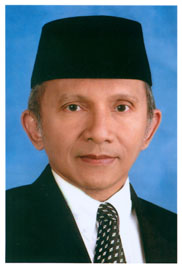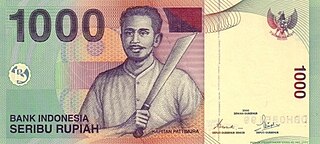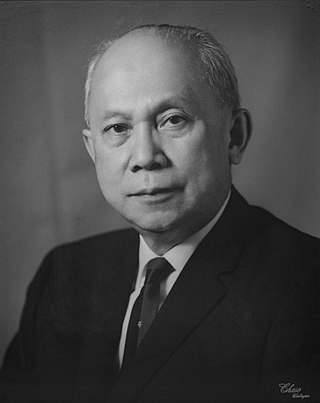Related Research Articles

Abdurrahman Wahid, though more colloquially known as Gus Dur, was an Indonesian politician and Islamic religious leader who served as the 4th president of Indonesia, from his election in 1999 until his removal from power in 2001. A long time leader within the Nahdlatul Ulama organization, he was the founder of the National Awakening Party (PKB). He was the son of Minister of Religious Affairs Wahid Hasyim, and the grandson of Nahdatul Ulama founder Hasyim Asy'ari. He had a visual impairment caused by glaucoma; he was blind on the left eye and partially blind on his right eye. He was the first and as of 2023 the only president of Indonesia to have had physical disabilities.

Mohammad Hatta was an Indonesian statesman and nationalist who served as the country's first vice president. Known as "The Proclamator", he and a number of Indonesians, including the first president of Indonesia, Sukarno, fought for the independence of Indonesia from the Netherlands. Hatta was born in Fort de Kock, Dutch East Indies. After his early education, he studied in Dutch schools in the Dutch East Indies and studied in the Netherlands from 1921 until 1932.

Muhammad Amien Rais is an Indonesian politician. He was one of the leaders of the reform movement that forced the resignation of President Suharto in 1998. Amien Rais was the leader of Muhammadiyah, one of the two biggest Muslim organizations in Indonesia, from 1995 to 2000. He was the Chairman of the People's Consultative Assembly (MPR) from 1999 to 2004. During his chairmanship, the MPR passed a series of amendments to the Constitution of Indonesia. These amendments, among other things, established direct presidential elections, a presidential term limit, and the Constitutional Court.

Suharto resigned as President of Indonesia on 21 May 1998 following the collapse of support for his 32-year long presidency. Vice President B. J. Habibie took over the presidency.

Ruslan Abdulgani was an Indonesian government official and diplomat known for his role as a leader during the Indonesian National Revolution in the late 1940s, and as a key minister and United Nations ambassador in the Sukarno government during the 1950s and 1960s.

The New Order is the term coined by the second Indonesian President Suharto to characterise his administration as he came to power in 1966 until his resignation in 1998. Suharto used this term to contrast his presidency with that of his predecessor Sukarno.

The Post-Suharto era is the contemporary history in Indonesia, which began with the resignation of authoritarian president Suharto on 21 May 1998. Since his resignation, the country has been in a period of transition known as the Reform era. This period has been characterised by a more open political-social environment and grassroots economic improvement.

Budiman Sudjatmiko is an Indonesian activist and former politician of Indonesian Democratic Party of Struggle. He was a political prisoner during the final years of the Suharto regime.

Johannes Cornelis Princen, also known as Poncke Princen, was a Dutch anti-Nazi fighter and activist. In 1948, he deserted the Dutch military, joining the Indonesian independence guerrillas in what was then the Dutch Indies.

Thomas Matulessy, also known as Kapitan Pattimura or simply Pattimura, was a famous Ambonese soldier who became a symbol of both the Maluku and Indonesian struggle for independence, praised by President Sukarno and declared a national hero by President Suharto. He has several namesakes in both the Netherlands and in the Indonesian archipelago.

Christmas in Indonesia, locally known as Natal from the Portuguese word for Christmas, is celebrated with various traditions throughout the country.

Lambertus Nicodemus Palar, also known as Babe Palar, represented the Republic of Indonesia in various diplomatic positions most notably as the first Indonesian representative to the United Nations. He also held ambassadorships in India, West Germany, the Soviet Union, Canada, and the United States. He was the son of Gerrit Palar and Jacoba Lumanauw.

East Timor and Indonesia established diplomatic relations in 2002. Both share the island of Timor. Indonesia invaded the former Portuguese colony in 1975 and annexed East Timor in 1976, maintaining East Timor as its 27th province until a United Nations-sponsored referendum in 1999, in which the people of East Timor chose independence. Following a United Nations interim administration, East Timor gained independence in 2002. Indonesia already had a consulate in Dili during the Portuguese colonial period, though Indonesia formalized their relations by establishing an embassy in Dili. Since October 2002, East Timor has an embassy in Jakarta and consulates in Denpasar and Kupang. Relations between the two countries are generally considered highly positive, despite various problems. Numerous agreements regulate cooperation in different areas. East Timorese are visa-free in Indonesia.

Indonesia and the Netherlands share a special relationship, embedded in their shared history of colonial interactions for centuries. It began during the spice trade as the Netherlands established the Dutch East Indies Company (VOC) trading post in what is now Indonesia, before colonising it as the Dutch East Indies until the mid 20th century. Indonesia was the largest former Dutch colony. In the early 21st century, the Dutch government has committed to boosting its relationship with Indonesia, noting that economic, political, and interpersonal contacts should be further strengthened.
Maria Ulfah Soebadio Sastrosatomo, better known by her first married name Maria Ulfah Santoso, was an Indonesian politician and women's rights activist who served as Minister of Social Affairs under Prime Minister Sutan Sjahrir. She was the first Indonesian woman to receive a degree in law as well as the first female Indonesian cabinet member. Santoso, the daughter of a politician, became interested in women's rights after seeing numerous injustices in her youth. Despite pressure to become a doctor, she graduated with a degree in law from Leiden University in 1933; while in the Netherlands she also became involved in the Indonesian nationalist movement.

Whulandary Herman is an Indonesian actress, television host, model and beauty pageant titleholder and beauty pageant titleholder. She was crowned Puteri Indonesia 2013 and represented her country at the Miss Universe 2013 pageant, where she advanced to the semifinals and placed in the Top 16, ending a 7-year drought for Indonesia. She is the second Indonesian and Sumatran to be called as Miss Universe Finalists after Artika Sari Devi who placed for the first time in Miss Universe 2005.
Johannes Baptista Soedjati Djiwandono was an Indonesian political scientist who helped found the Centre for Strategic and International Studies (CSIS) in Jakarta, one of Indonesia's leading think tanks.
Luluk Purwanto or Purwanto is an Indonesian jazz violinist who extends the violin's sound with her voice. She has recorded since the 1980s. She has lived in the Netherlands and in Germany.
Julia Indiati Suryakusuma is an Indonesian feminist, journalist, and author. She is known for her outspoken writing on sexuality, gender, politics and religion. She has been described as Indonesia's most provocative columnist.

Rocky Gerung is an Indonesian philosopher, academic and public intellectual.
References
- ↑ "PIJAR - Penghargaan Pijar Demokrasi" Archived 2012-01-17 at the Wayback Machine Apakabar, 06 Desember 1995. Diakses 8 Mei 2013.
- ↑ "Yeni Rosa Damayanti: "Indonesia Berbeda Dibandingkan 30 Tahun yang Lalu"" Archived 2013-02-09 at the Wayback Machine Tempo, 06 Juni 1998. Diakses 8 Mei 2013.